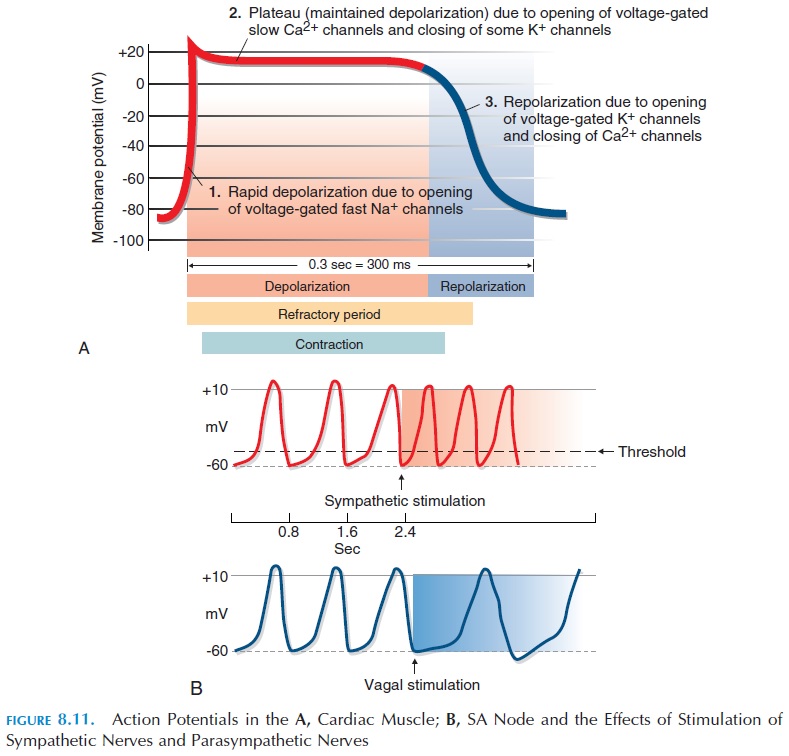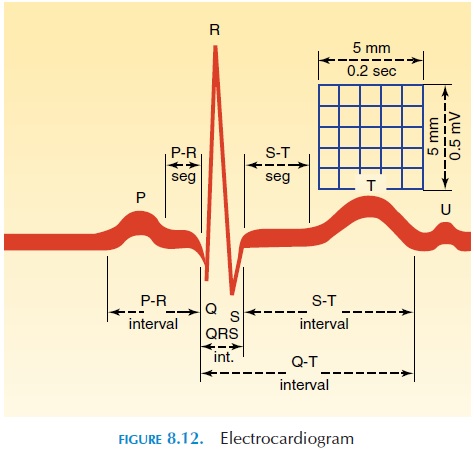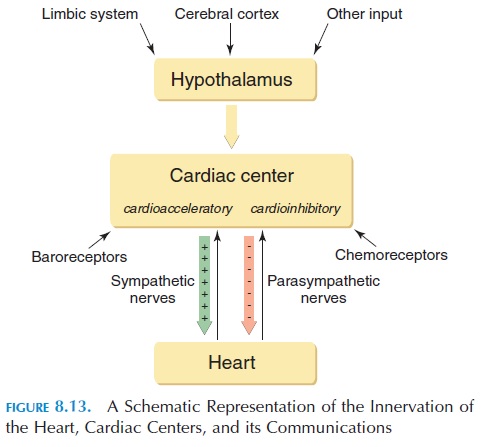Chapter: The Massage Connection ANATOMY AND PHYSIOLOGY : Cardiovascular System
Cardiac Centers, Innervation of the Heart, and Factors Affecting Heart Rate
Cardiac Centers, Innervation of the Heart, and Factors Affecting Heart Rate
The rhythmic contraction of the heart, as described, is a result of regular action potentials produced in the pacemaker. But this rhythm can be altered by the ac-tion of autonomic nerves that innervate the heart (see Figures 8.11 and 8.13). Postganglionic sympathetic neurons arising from the cervical and upper thoracic ganglia innervate the SA node, AV node, atria, and ventricle. Parasympathetic fibers reach the heart via the vagus nerve (cranial nerve X).

Both the sympathetic and parasympathetic neurons communicate with the cardiac centers located in the medulla oblongata. One part of the cardiac center is the cardioacceleratory center. Neurons from this center increase the heart rate and force of contraction of the heart via their communication with the sympa-thetic nerves. When the sympathetic nerves to the heart are stimulated, they increase the rate at which the SA node generates impulses and the heart rate increases.

The cardioinhibitory center, another part of the cardiac center, acts via the parasympathetic nerves (vagus nerve), slowing the heart rate and decreasing the force of contraction.
The cardiac centers have many other communica-tions. They have connections with higher centers like the hypothalamus. The hypothalamus, in turn, has communications with various parts of the nervous system. In this way, the activity of the heart can be af-fected by numerous factors.

In addition to the hypothalamus, the cardiac centers receive input regarding the status of the cardiovascular system—blood pressure, blood volume, stretch of the chamber walls of the heart—through afferent (sensory) autonomic nerves. Some of the important input it re-ceives is from baroreceptors and chemoreceptors. These receptors, located in and near the walls of large blood vessels, detect changes in blood pressure (from baroreceptors), carbon dioxide, hydrogen ion, and oxy-gen levels in the blood (from chemoreceptors), and the impulses from them reach the cardiac center via the glossopharyngeal nerve (cranial nerve IX) and the va-gus nerve (cranial nerve X). The cardiac center, in turn, ensures that adequate blood supply is maintained to vi-tal organs, such as the brain.
Anger, painful stimuli, exercise, inspiration, re-duced oxygen levels, adrenaline and noradrenaline in the blood, fever, increase in body temperature, and thyroid hormones all increase the heart rate. In gen-eral, stimuli that increase heart rate also increase blood pressure. Heart rate is slowed by increased ac-tivity of the baroreceptors—when the blood pressure increases, expiration, fear, and grief, among others.
Another factor that alters SA node pace is the ionic composition of the extracellular fluid. For example, an increase in extracellular potassium increases the heart rate. Calcium and sodium ion levels also have an effect.
Heart rate is also affected by the individual’s age, gender, physical fitness, and body temperature. For example, infants have a faster heart rate. Adult fe-males have a slightly higher heart rate than adult males. A physically fit individual has a slower heart rate. A decrease in temperature slows down the heart rate, by reducing metabolism.
Related Topics